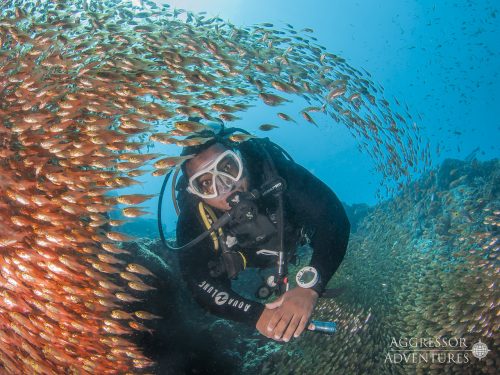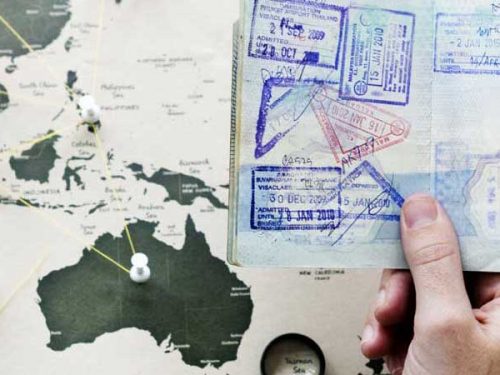
Tipping at a restaurant or for a service provider is almost always customary but come time to tip for your dive-service, that may leave some a tad confused. Are you supposed to tip at all? Under what circumstances, how much, and who should you be tipping exactly?
Your dive is supposed to be enjoyable and you don’t want to be agonizing over how much to tip. So here are some tipping scuba diving tips you can use as a guide on your next dive trip:
How Much Should You Tip?
Generally speaking, tipping guidelines are based on a number of factors:
How much did your dive cost? Diving prices are going to range depending on the area and your location. As a generalization, a good rule of thumb to consider is to tip $5USD to $10USD per dive (per tank). When you break that down that is roughly leaving a tip of 10 to 20 percent based on the service provided and your overall experience.
Sometimes gratuities are included on group trips or on certain liveaboards, so make sure to note whether or not that’s the case. If so, consider a small top-up to individuals that made things extra special and went above and beyond for your dive experience.
Who Should You Tip?
Knowing who to tip can also get rather confusing. Some operators explain how to leave a gratuity, and sometimes it’s completely up to you. At the end of the day if you don’t know, just ask.
A simple rule of thumb is to consider tipping your guide, the boat crew, tank handlers, and any other staff that helps you during your diving experience.
Often in-water staff and boat captains share tips, and some shops and operators split gratuities between all staff. Don’t forget that staff may be doing tasks that aren’t readily seen such as filling tanks, arranging for special excursions, or rinsing your gear at the end of the day. Those people may not be on the boat with you. Often a general tip for shop staff, and extra for those who ran your dives is a good approach.
For those in the midst of dive training, tipping your dive instructor may be appropriate. You did pay for the course, but tipping the staff who helped you during the training are always appreciative of a little something extra.
For the owners and operators, many make their living off of the dive or course costs. If this is the case, base your tip on the operator’s size. Are they a large company, a small team of individuals? If the owner or specific operator is present day in and out, a small tip may be warranted. If the owner or manager of a smaller operation is guiding your dives or driving the boat, tip them like you would a dive staff.
When Should You Tip
If you are certain you will be diving with only one crew and one guide, you can tip at the end of the week. Otherwise, it is a good idea to bring small bills and tip after each dive or day of diving. That way, if the guide you have had all week or a particular staff member is off the last day of your trip, you don’t have to worry about delivering a tip to him or passing it off to someone else. This also eliminates the confusion of remembering who and when to tip.
At the end of the day, it is what you are most comfortable with. If you’d rather provide a lump sum to be divided at the end of the trip, or to tip as you go feel free. There really is no right or wrong way to go about it.
Rules for Tipping Abroad
Is tipping customary in all countries? Here is a general guide for tipping rates when diving in popular locations overseas:
The Caribbean
The same as in the US ($5-$10 per tank per diver or 15%-20% of the cost of the charter)
Polynesia
Tipping in Tahiti and the Polynesian area is not customary or expected; however, if you enjoyed your divemaster, tipping them directly around $5USD per dive ($10USD for exceptional service).
Australia/New Zealand
In a land where tipping is not always customary, you can leave a 10% – 15% tip for your crew but sometimes in these areas, they won’t accept them.
Thailand & The Philippines
$10USD per every 2-tank dive per person is recommended but to be discrete.
Fiji

Sharing is an integral part of Fijian culture. In many resorts or dive shops, you will see a “Staff Christmas Fund” box where guests can place their tips anonymously for the entire resort staff. The amount collected is divided equally among staff members, including those who only work in the background (maintenance, gardeners, cooks, etc.).
Liveaboards
The crew on a liveaboard generally deserves a bit larger of a tip than your 2-tank boat charter. The liveaboard crew not only acts as your divemaster’s but also cooks your meals, makes your beds and keeps everything running. Therefore, it is customary to tip the liveaboard crew around 10% of the cost of your trip or the general rule is $250USD – $350USD minimum for a one week trip. Most liveaboards prefer receiving their tips in cash as it’s easier to divvy up and for convenience; only a few will accept credit cards for it.
Something to keep in mind if your liveaboard is mostly frequented by Europeans, you can assume the crew is used to less gratuity/tips than those who are used to guests from North America. Generally speaking, in Europe a price usually has a service charge built-in so they are accustomed to not tipping much if anything at all.
In remote destinations, boat staff really depend on these gratuities, as they usually represent a big portion of their income. Remember that the majority of your fare will go to the owner or operator of the liveaboard, not the crew. In most parts of the world, working in the dive industry is not a high paying profession. Low wages are especially common among local workers, who may earn less than foreigners in the industry.
Still unsure on the amount of who to tip? If you still are a little confused about tipping for your scuba dive, just ask around. Ask some of the locals and some of your fellow divers. They can guide you as to what is appropriate and customary in the area.
Just remember the general rule when it comes to tipping guidelines for divers is easy: take good care of dive staff, and they’ll take good care of you!








